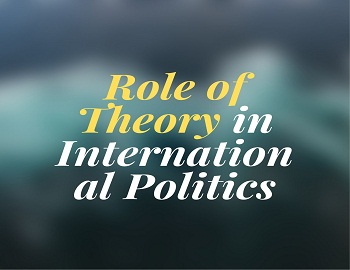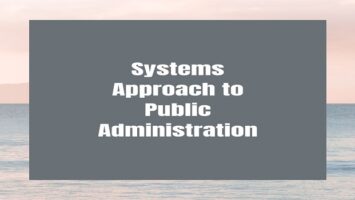Political Environment and Public Administration:
Political environment also acts as an important setting for the functioning of Public Administration. The political environment affects Public Administration as much as the social environment. The nature of the political system, the provisions of the constitution, the constitutional laws governing the organization and working of Public Administration, and the relationship of civil servants with the members of the political executive depend upon the nature and scope of relevant constitutional provisions and the form of the government. In fact, many scholars hold the view that like milk and water, politics and administration very easily get mixed up with each other. Politics without Public Administration can never really carry out its objective of securing national interests and objectives and Public Administration without Politics is always directionless and irresponsible. Since the behavior of the political system is conditioned by its psychological and sociological environment (Political Culture and Socialization), Public Administration is also affected by these. Scholars discuss the different dimensions or variables of political culture to analyze the influence of the political environment on public administration.
(1) Loyalty to the National Community- Loyalty and commitment towards national values, beliefs, and orientations (i.e. Political Culture) affects the operation of Public Administration. The culture of the nation is a determinant of the nature, organization, and working of bureaucracy. Loyalties towards family, language, religion, caste, and ethnic group over and above the nation diminish individuals’ commitment to the national political system and produce a potential for political unrest and instability. So long as these affect public administration, society continues to suffer from social tensions and strains. In such a situation, political decision-making becomes very difficult and it adversely affects the objectivity and impartiality that is expected of public administration.
On the other hand, where national integration has been achieved and where the bureaucracy and the public at large share the same language and value system that promotes trust between them, society and public administration both remain free from aggressive social tensions and strains.
(2) Equally and Public Administration- In modern civilized society, recruitment to public services is based on the principle of equalitarianism. The ability or achievement of the individual and merit is the criteria for selecting or rejecting him or her for entry into the civil service. Public Administration is efficient and productive when its personnel is recruited on a merit basis and they represent merit in society. In a traditional society, the criteria of recruitment may be class, status, race, language, and caste. In this case, the Public Administration always fails to be enduringly productive of good and desired results. Here, the contradiction between the principle of hierarchy and the principle of equality exists. In an environment of social inequality, everyone strives to establish his hierarchical position vis-a-vis others. In other words, the existence of equality or inequalities in the social system is a determinant of the organization, nature, and working of the Public Administration.
(3) Nature of Policy and Public Administration- The immediate environment which affects the working of Public Administration is constituted by the nature of the governmental organization. A democratic, responsive, and responsible government enjoying the confidence and support of the people in general and their elected legislature, in particular, determines the quality and quantity of work being undertaken and accomplished by civil servants. An unpopular and authoritarian government can adversely affect the working of Public Administration. In the name of a committed bureaucracy, it can harm the public image of the administration being run by civil servants. Undue political interference and control over the appointments, transfers, and promotion of civil servants is always a source of low morale and inefficiency in the Public Administration.









Comments (No)